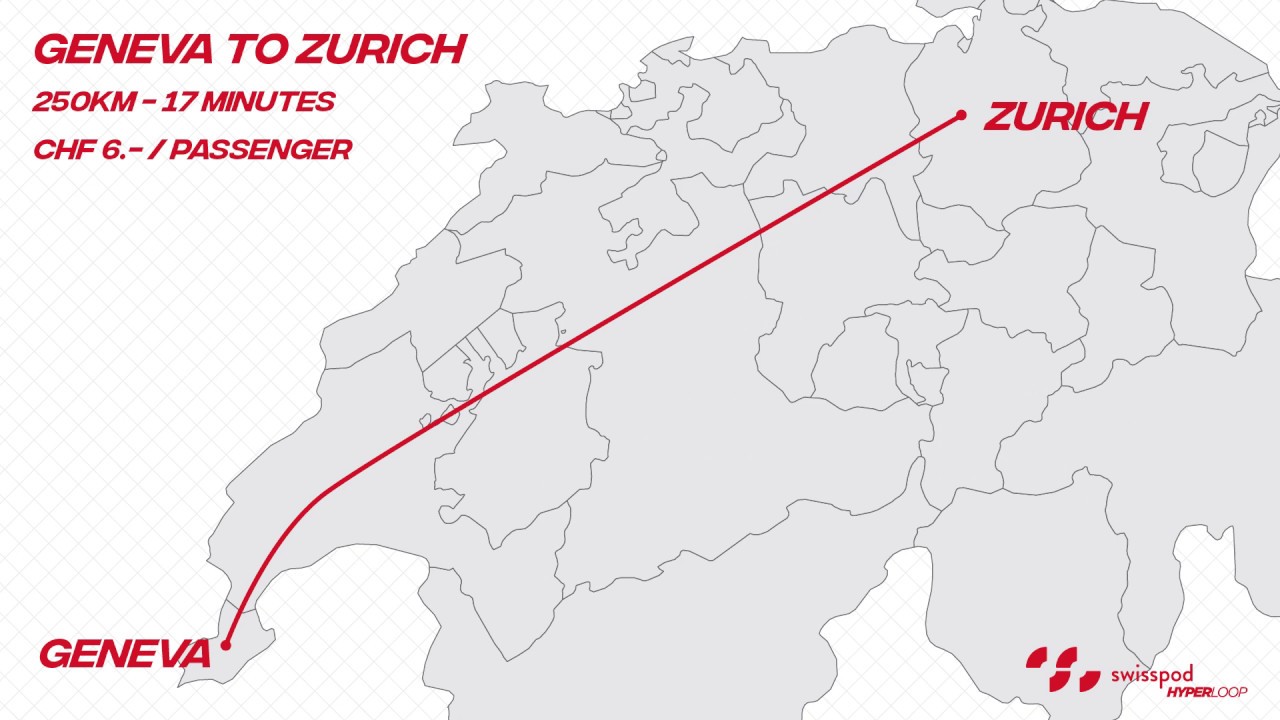Swisspod – Building the infrastructure and the pod for hyperloop
Our advancement as a society is supported by transportation. Being able to reach the various corners of our world has been beneficial to our economy and culture, but it had a negative impact on the environment.
Transportation is a source of noise and smog, it contaminates water and soil, influences biodiversity and produces carbon monoxide emissions which have direct harmful effects.
Climate change is the cumulative impact of several natural and anthropogenic factors. Transportation is responsible for a 22% share in global CO2 emissions.
Is there a better way to go from one place to another that is faster, more affordable but sustainable and green?
Yes, it is.
Hyperloop is the 5th mode of transportation
The transportation of the future is called Hyperloop, a term coined by Elon Musk, the brilliant entrepreneur and visionary owner of SpaceX and Tesla. Elon believes the hyperloop is the 5th mode of transportation.
In 2015 he launched the Hyperloop Pod Competition where a number of student and non-student teams are participating to design and build a subscale prototype transport vehicle to demonstrate the technical feasibility of various aspects of the Hyperloop concept.
The high-speed train is not a new concept in Europe, specifically Switzerland. Switzerland has a long tradition of designing and developing vacuum tubes trains going back to the 1970s. These designs were the work of Marcel Jufer, professor at the École Polytechnique Fédérale de Lausanne.
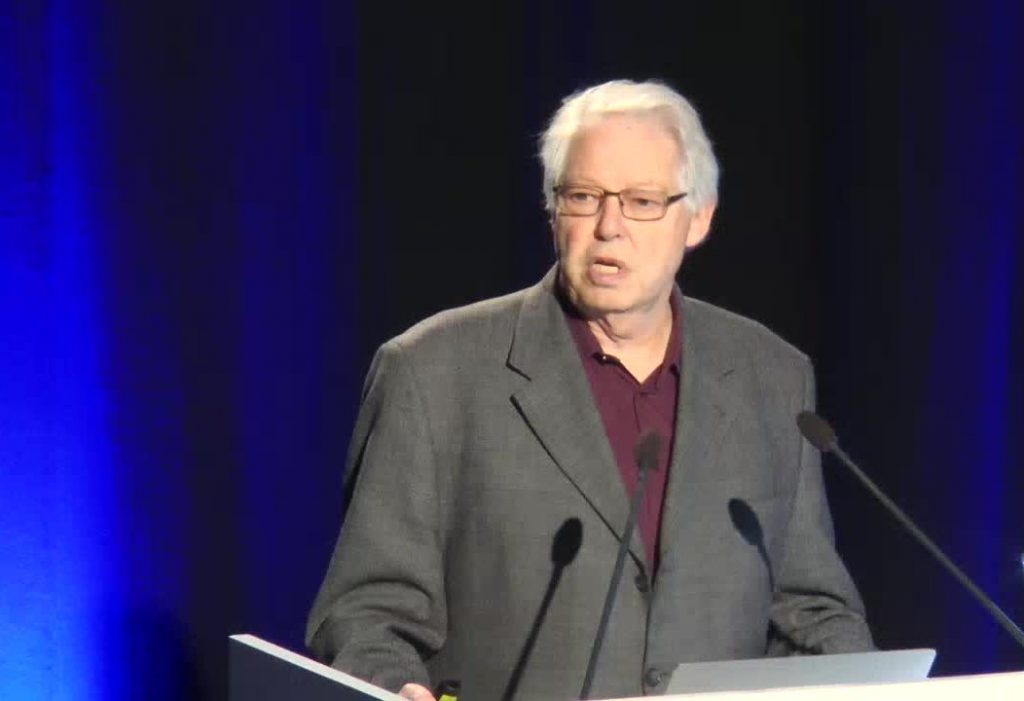
Prof Marcel Jufer / swisspod.ch
Prof Jufer envisioned Swissmetro, a futuristic Swiss national transportation project using vactrain technology. The trains would have significantly lowered the travel time between major cities in Switzerland. Unfortunately, the project failed to gain support and remained only on paper.
Marcel Jufer’s designs might have been seen as wishful thinking and lacking economic viability forty years ago, but now the technology allows them to translate into reality.
Swisspod – Building an eco-friendly high-speed hyperloop system
Swisspod is a Swiss company building the transportation of the future by leveraging the hyperloop concept.
Their mission is to fight for a fossil-fuel-free and zero-emissions transportation world.
To achieve the company’s goal, its team lead by co-founders Denis Tudor and Cyril Dénéréaz designed a pod that is 10x faster than an electrical car and 4x less polluting.
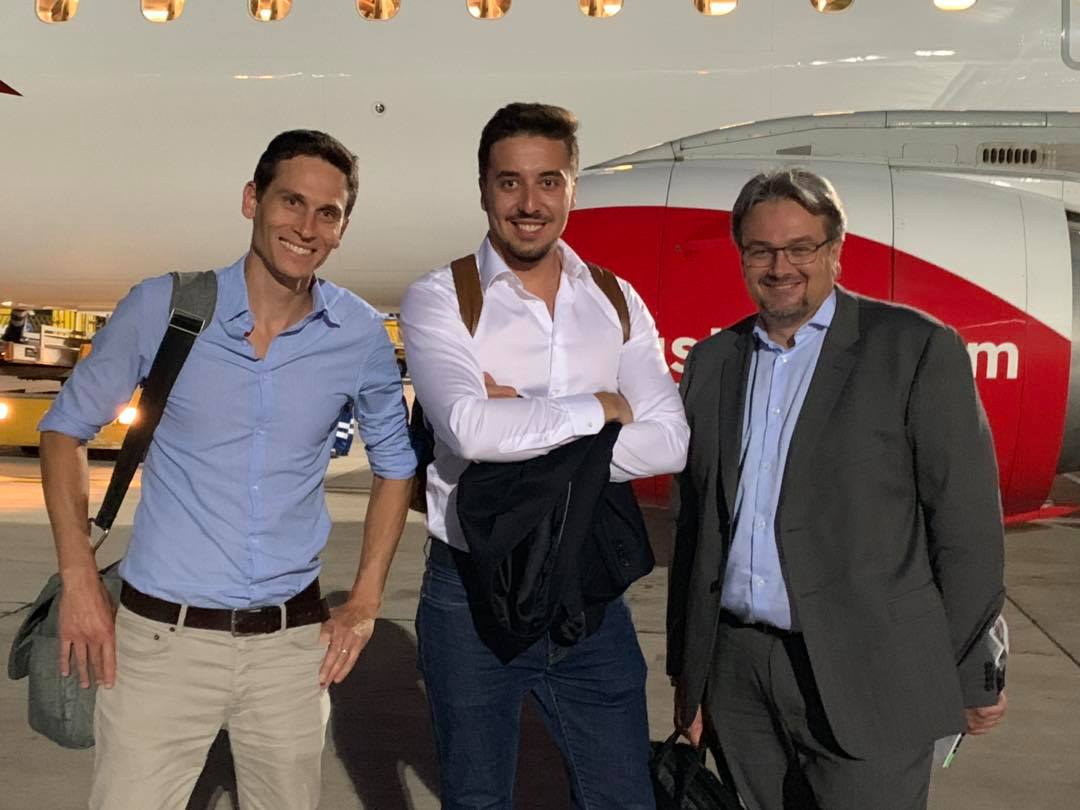
From left to right: CTO and co-founder Cyril Dénéréaz, CEO and co-founder Denis Tudor and Gael Diridollou (finance and business), a member in the advisory board
Both Denis and Cyril have experience in solving engineering problems related to the hyperloop concept.
Denis Tudor participated in every edition of the Hyperloop Pod Competition since Elon launched it in 2015 first as a member of team rLoop then he founded his own team, EPFLoop. As part of his teams, he won 1st prize four times (Innovation, Most Reliable System and twice for Best Design) and 3rd prize for Speed. He is now a PhD student in Electrical Energy of the Hyperloop System at École Polytechnique Fédérale de Lausanne.
Cyril Dénéréaz is an engineer at Mechanical Metallurgy Laboratory at École Polytechnique Fédérale de Lausanne. He also participated in the Hyperloop Pod Competition as an adviser in Denis’s team and came home with 1st prize for Most Reliable System and 3rd prize for Speed.
Also, esteemed professor Marcel Jufer is a member of the advisory board.
Swisspod capsule design
The pod utilizes active levitation, enabling the hover engines to produce optimal lift. Furthermore, the company’s network of underground depressurized tunnels will significantly mitigate structural degradation of the capsule caused by the thermal expansion that occurs in above ground, tube infrastructure.
The capsule is situated in a relatively low-pressure atmosphere with the main cabin being pressurized. It is an energy-autonomous driverless vehicle which works on batteries in order to reduce the cost of the infrastructure and maintenance.
Swisspod is also designing the batteries, the pods and the infrastructure. The team calculated that their solution is 70% more affordable than a Muglev infrastructure.
The team expects to launch its first hyperloop pod by 2035.
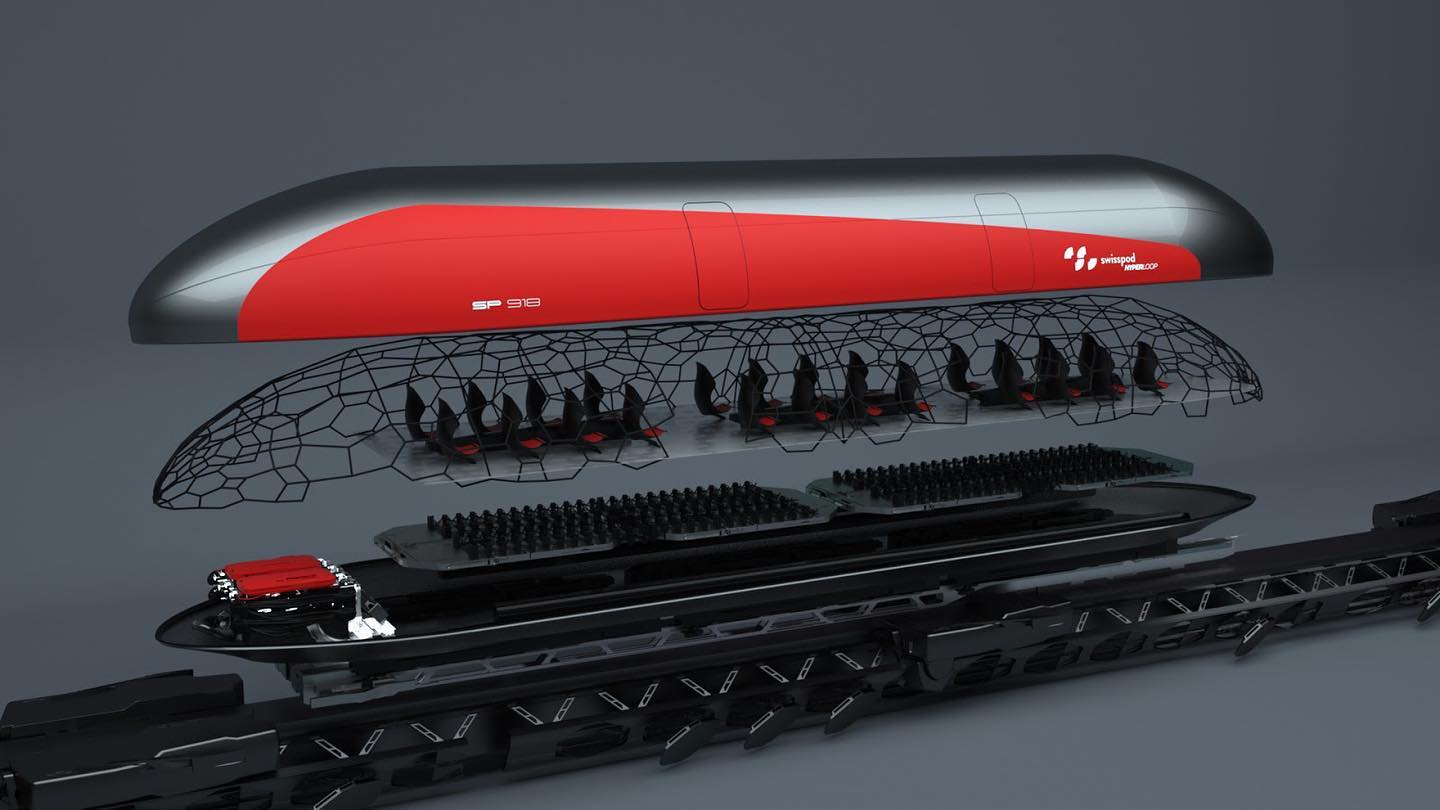
The Swisspod capsule
Introducing a new era of passenger transportation. Sustainable. Eco-friendly. Efficient. Responsible. Safe. Supersonic.
Swisspod
The Swisspod team is working on the following project: getting people from Geneva to Zürich in 17 minutes. Right now, it takes three hours by train. The capacity of Swisspod’s vehicle is 25-30 people and the ticket could cost up to 70 CHF.
How eco-friendly is their pod?
Their solution ranges between 35 and 55 Wh/passenger/kilometre (electrical energy) for the Geneva-Zürich route in a time range of 16-17 minutes. Nowadays, the alternative for this high-speed transportation system is 515 Wh/passenger/kilometre (fossil fuel energy) in a time range of 45 minutes + boarding procedures.
Building the pods could cost an estimate of $1.8 million per pod and developing the infrastructure between Geneva and Zürich could go up to $11 billion, said Swisspod CEO and co-founder Denis Tudor this year in an interview for CNNMoney Switzerland.
In the last decades, no major improvement in transportation has been made. We do believe that is the time to reconsider how we travel.
Swisspod
Join the Conversation
We’d love to hear what you have to say.
Get in touch with us on Facebook Group and Twitter.
Denis Tudor (co-founder at Swisspod Technologies): Hyperloop is the future of transportation
Denis Tudor is CEO and Co-founder at Swisspod Technologies. His startup is building the most efficient and affordable Hyperloop solutions.

CEO & co-founder Swisspod Technologies Denis Tudor
I reached out to Denis to learn more about the hyperloop and why he believes it is the future of transportation.
1. Speed is killing the planet. How does the hyperloop help stop the climate crisis?
Speed is killing the planet. I think it is time to focus on efficiency and sustainability. Our Hyperloop company, Swisspod, focuses to bring on the market the most affordable and efficient Hyperloop solutions, which means sustainability.
To fix ideas, for an average travelling speed 10x more than an electrical car, the CO2 emissions/km/passenger are 4x less.
We do need to stop the climate crisis and it is our duty (scientists and entrepreneurs) to convince the decision-makers to implement such solutions.
At the moment, we focus on reducing the CO2 footprint in Switzerland for a route between Geneva and Zurich (226 km). We propose a solution of 17 minutes for an energy consumption cost per passenger per journey of around 8 CHF.
2. What is the 5th mode?
5th mode is… the 5th mode of transportation. We have planes, trains, cars and boats.
Hyperloop will be the new mode of transportation which can be defined “as fast as a plane, as convenient as a train”.
It represents a transportation solution which can achieve sonic speed (1200 km/h) with lower CO2 emissions and energy consumption.
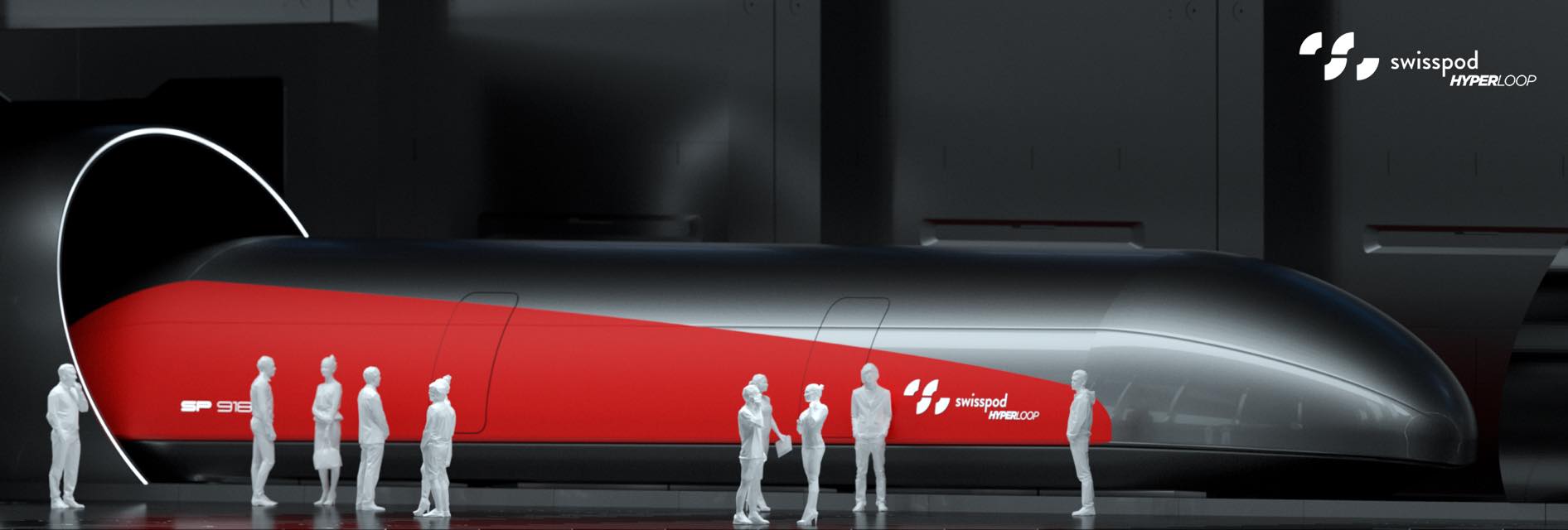
The Swisspod hyperloop pod design / Swisspod.ch
3. Your team entered the SpaceX Hyperloop competition this year and was the third-fastest transport pod. Your pod also ranked 1st in safety. Congratulations!
Thank you. Actually, my experience in Hyperloop is much longer.
I started this adventure in 2015 when Elon Musk launched the first Hyperloop Competition ever. The first competition was held in 2 different stages: design weekend and competition weekend. Around 10k teams from the entire world registered in the competition. We got the first prize for the best design award from Elon Musk.
After we won the Design Weekend in January 2016, we had a crowdfunding campaign in the Silicon Valley where we managed to fundraise the money we wanted. We had different collaborations with companies in Silicon Valley, as well as with NASA Ames California.
In September 2016 we won the first prize for the best design at a Hyperloop competition in Dubai.
In January 2017, the competition weekend was organized and we were awarded the Best Innovation Award after we built what we proposed at the design weekend. This was the second first prize from Elon Musk. Due to some issues, in the second competition, we did not get any award and I left the team.
I arrived in Switzerland and I created my own team here. At the third competition, we were awarded the first prize for safety and third prize for speed.
As a conclusion, I was awarded 4 different prizes in the last 3 years with 3 different capsules from Elon Musk: 1st prize for the Best Hyperloop Design, 1st prize for Innovation, 1st prize for Safety, 3rd prize for speed.
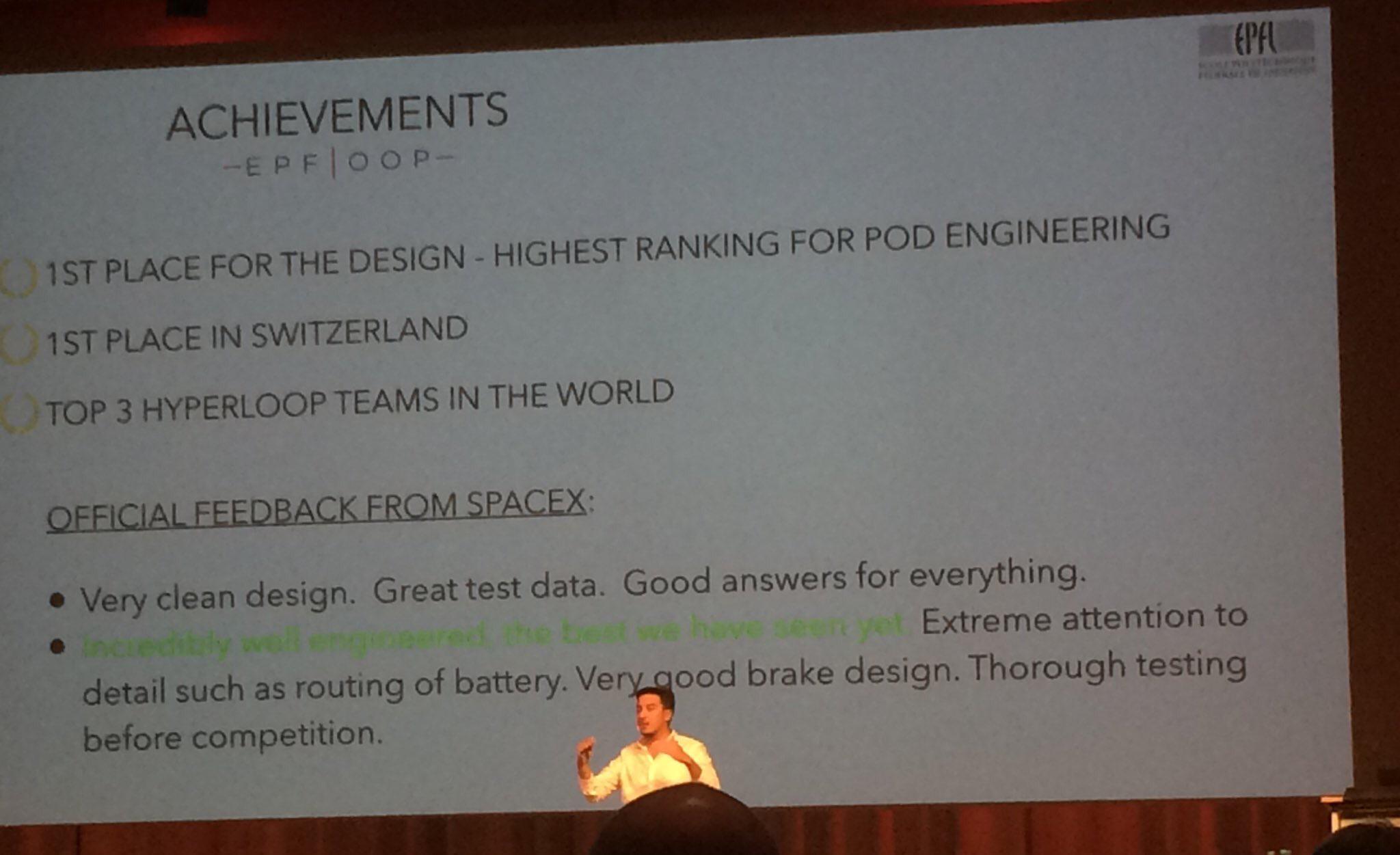
Denis Tudor at the biggest event in EPFL / LinkedIn
Now, I am retired from the competition and I opened my start-up with a Swiss person. I think it is time to let other young people push boundaries and have better results than us.
My only regret is that I did not win the 1st prize for speed, but yeah… speed is killing the planet.
At the moment, I focus on my start-up in Switzerland, Swisspod and on my PhD studies. I do a PhD in optimal sizing of the Hyperloop capsules in electrical energy. World-widely, this PhD is ranked second after Singapore. So, yes, pretty tough life… kidding. It is fun.
4. What was it like to meet Elon Musk? What did he like about your pod design?
Elon is a nice guy. I met him twice.
The last meeting was in the summer of 2018 where we had a meeting of about one hour. We had a very nice conversation and he inspired me to create the Swisspod Technologies company.
We also discussed the future of transportation and our pod design. He was especially impressed by our battery energy storage system which had a better performance than a Tesla.
Just to give you an idea, we created a vehicle whose power to mass ratio is 3x more than a Bugatti Veyron and 2x more than a Tesla.
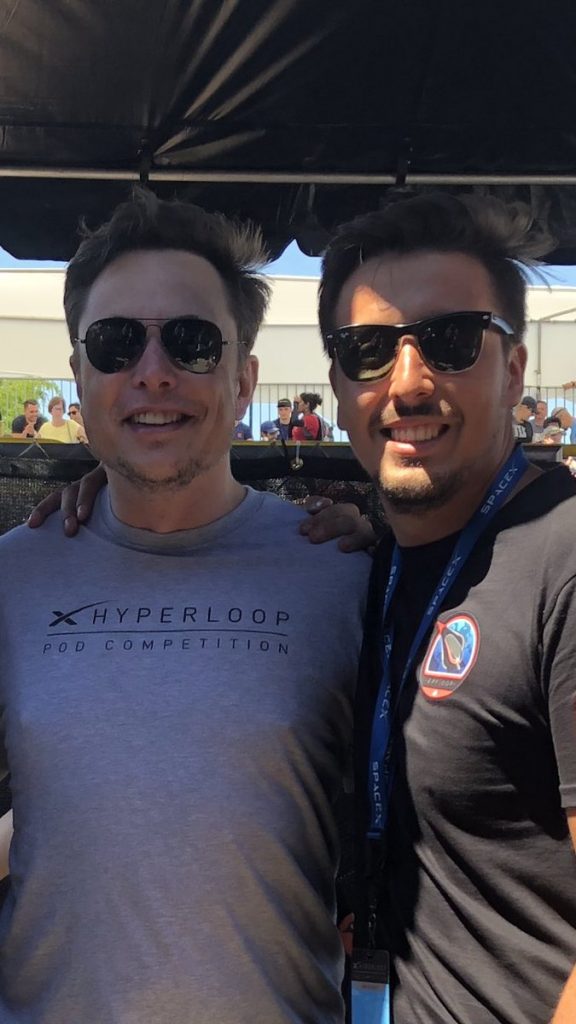
Denis Tudor and Elon Musk
5. Share your vision of the future.
I hope Hyperloop will represent one of the transportation solutions. I do believe in complementary transportation solutions which means that we need to interconnect the different modes of transportation.
I believe in a fossil-fuel-free world and very low CO2 emissions. This represents a very important issue that needs to be solved worldwide.
In my vision of the future, AI will play a vital role but it will be constrained by different boundaries created by humankind.
Join the Conversation
We’d love to hear what you have to say.
Get in touch with us on Facebook Group and Twitter.
